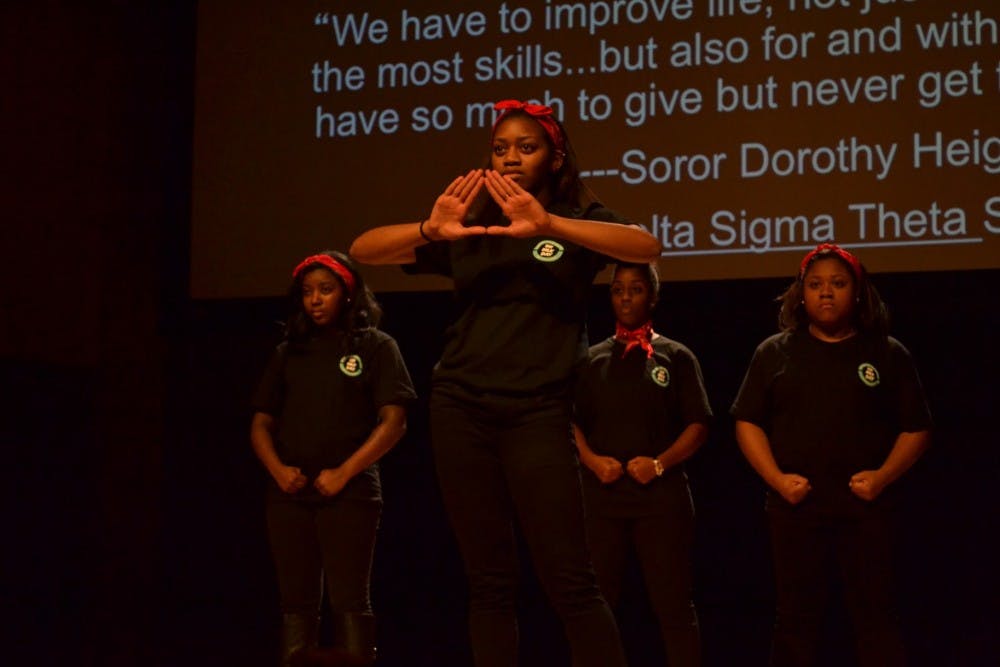About 150 audience members rose to their feet in applause after an emotional keynote address from President Ed Ayers at Richmond’s Martin Luther King Jr. holiday commemoration ceremony Monday evening.
The commemoration ceremony concluded Richmond’s Day of Service and Learning, a collaborative effort to encourage the campus community to honor King’s legacy and engage his dream, according to the university website.
Ayers’ address, titled “Where Did the Civil Rights Struggle Come From?” explored the post-Civil War efforts that formed the foundation for the civil rights movement. Ayers also highlighted the historical significance of several Richmond sites visited during a bus tour that he guided that morning.
“So where did the civil rights movement come from?” Ayers said. “It grew out of the daily struggle and heroic accomplishments of 100 years of ceaseless stride – out of the unbroken belief that this nation would finally live up to its founding words.
It did not simply appear in 1954, but had been growing since 1865.”
University Chaplain Craig Kocher welcomed the audience to Camp Concert Hall in the Modlin Center for the Arts. Several performances during the ceremony engaged the social and cultural factors that led to the civil rights movement. Others brought perspectives to modern-day issues such as the cases of Trayvon Martin, Michael Brown and Eric Garner. Ngoma African Dance Company energized the audience with a drum and dance right of passage performance, and the National Pan-Hellenic Council earned a lively applause for its stepping routine.
“The unity and the passion were just really palpable,” said Richard Jennis, a junior who attended the ceremony. “There was so much support from the people watching, and it was good to be a part of it.”
Holly Rodriguez, director of communications for First Unitarian Universalist Church of Richmond, performed first with a reading of her poem “The Women of the Dream.” The poem highlighted women of significant influence on both King and the civil rights movement.
Sophomore William Moncure and senior Devin DeFrancesco shed insight on the consequences of voter identification laws. These laws were passed in order to prevent voter fraud, but they restrict honest citizens who may not have proper identification from voting, Moncure said. Defrancesco said the occurrence of voter fraud was quite low. Moncure and Defrancesco are representatives of the Roosevelt Institute, a campus network that aims to empower and promote young leaders.
“[The voting laws] sound innocuous, when they are actually extremely targeted,” DeFrancesco said. “If you look at the actual effects of [them], that’s where it becomes incredibly unjust.”
“King was an advocate for voting rights throughout his lifetime,” Moncure said. “In honor of King’s legacy, we must work to ensure that everyone’s right to vote is protected.”
Selamawit Yemeru, president of Black Student Alliance, offered a personal reflection that was geared toward the Michael Brown case and other timely cases in which the lives of African-Americans have been taken.
Enjoy what you're reading?
Signup for our newsletter
“This issue is larger than the media, the police or the government,” Yemeru said. “It is a social issue that involves everyone and especially calls on black peace. It is time that the people start to talk about the perceived value of a black life.”
Brittany Shawl, a local from Richmond who attended the ceremony, said Yemeru’s reflection had stood out to her. “I went to a majority white private school as well, so I could definitely relate to what she was saying,” Shawl said.
After Ayers’ keynote address, Ted Lewis, associate director of LGBTQ campus life, presented a gift to Ayers on behalf of the MLK committee. The gift, a photo book that chronicled Ayers’ accomplishments throughout his years of service at Richmond, was titled “Connecting King’s Dream to the Richmond Promise.” The Richmond Promise was a five-year effort that began in 2009 to make Richmond a more inclusive and diverse campus and engage its students to more community-based service opportunities.
Lewis said parts of King’s legacy had manifested through the Richmond Promise, and he praised Ayers’ contributions to the initiative.
Other events during Richmond’s Day of Service and Learning included a kick-off breakfast in the Heilman Dining Center. Provost Jacque Fetrow offered brief remarks during the meal, and attendants were encouraged to reflect on King before engaging in the day’s sponsored learning and service opportunities.
The Bonner Center for Civic Engagement offered seven service opportunities from 10:30 a.m. to 2:00 p.m. following the kick-off breakfast. Senior Rhiannon Bell participated in a service opportunity at Shalom Farms in Goochland. Bell said the group helped harvest carrots that she said would be given to FeedMore.
The Day of Service and Learning was a collaborative effort by offices including Common Ground, The Bonner Center for Civic Engagement, the President’s Office and more.
Contact Editor-In-Chief Clay Helms at clay.helms@richmond.edu and News Editor Alyssa Gunville at alyssa.gunville@richmond.edu
Support independent student media
You can make a tax-deductible donation by clicking the button below, which takes you to our secure PayPal account. The page is set up to receive contributions in whatever amount you designate. We look forward to using the money we raise to further our mission of providing honest and accurate information to students, faculty, staff, alumni and others in the general public.
Donate Now



